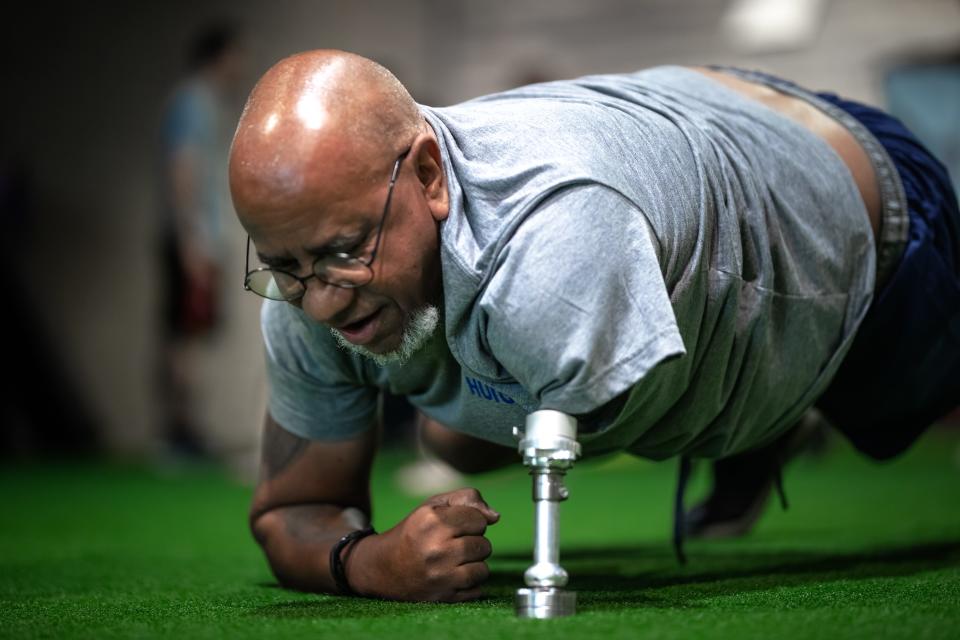Lebanon veteran wounded in Iraq wants you to know nothing is impossible
U.S. Army Sgt. William Santos lost his left arm in an IED explosion in Iraq in 2006. When he returned home, he shuttered himself off from the world, feeling angry and sorry for himself.
Eventually he was able to work through his problems with help from others, and now he's participating in a nine-week physical and mental rehabilitation program based out of Carrollton, Texas, called ReDefine. His biggest goal is to be able to bring what he learned back to those in need around his community.
Santos, who lives in Lebanon, is part of the 24th class to go through the Adaptive Training Foundation’s program.
It takes a small group of individuals − referred to as athletes − from all walks of life who have sustained major injuries, resulting in amputation or loss of movement. They tailor rehabilitation programs to fit each person's specific needs.
Read city news:Residents tell Lebanon city officials new LED street lights are a 'very bright' problem
Also of interest:Plane crashes into car at Reigle Airport, S. Londonderry Twp.
The program trains them both physically and mentally, teaching new exercises to keep them strong while also teaching them mindfulness techniques to ensure they don’t give up.
"When ATF started it was just the physical [training], and then we realized that honestly none of that matters unless you're focusing on what's going on between the ears. So that's where this mindset part of the program was created," said Adaptive Training Foundation spokesperson Laura Schaudt, adding, "It gives the opportunity for people to talk through what has happened."
It's completely free to participants and is paid for by sponsorships and donations. Training for each athlete costs roughly $10,000.
Santos hopes to take home what he learns and share it with others in similar situations.

“Ever since this happened, I’ve had this sense of wanting to learn more and be more stronger so I can help those that somehow been to the war and feel like they can’t do anything,” Santos said, “because once you lose a limb you think that this is the end, and it’s not.”
“I’m 62 years old, and I’m trying to get the younger people to realize that nothing is impossible.”
Santos, originally from New York, spent three decades in the Army and National Guard. In October of 2006, during a combat tour in Iraq, his vehicle was struck by an IED while on route clearance. He sustained the loss of his left arm below the elbow.
He struggled when he returned to the states, mostly staying locked inside his home, gaining 100 pounds. Santos said that during this period, he had no drive to go anywhere or do anything and that he felt sorry for himself and angry about what had happened to him.
What eventually got him back out into the world was getting involved with different non-profit organizations like the Wounded Warrior Project and Semper Fi Fund.
Since getting back out there, Santos has once again become active, accomplishing a 120-mile bike ride and participating in a Paralympics training camp for archery and track and field, before deciding to take the next step in his training with the ReDefine program.
“There’s learning more, as far as exercising is concerned. I want to be able to help anybody I can as far as getting them rehabilitated if they have to be.”
The athletes have mandatory training three days a week that begins with 20 minutes of mindset training followed by an hour and a half of high intensity physical training, followed by another 20 minutes of mindset training.
Santos said that his trainers have been able to push him hard, but not so hard that he would hurt himself, something that he needed.
Schaudt said that people with injuries like Santos' sometimes are treated like they're made of paper while in the gym or being trained. This can lead to frustration, over-compensation or even a lack of motivation in those just trying to accomplish goals in the gym like everyone else.
Santos said sometimes while training alone, he would push himself so hard that it would lead to injury just to prove to those around him that he wasn’t weak. For him, working on doing as good as he can has been a large part of his mental mindset training.
Early in the program, Santos’ trainers were able to identify a laceration in the back of his leg that had weakened it entirely.
Much of his program has been dedicated to rehabilitating that leg and strengthening his entire body.
When he returns home Santos plans on adopting many of the exercises he learned in the program into his own routine along with many of the mental wellness techniques including using his mantra "I'll stop when I die" as a motivation tool.
One of the biggest changes Santos has decided to adopt in his workout plan is the use of minutes, instead of sets of repetitions, for his workouts. For example, instead of doing three sets of 10 repetitions for an exercise like lunges, he'll being doing three sets of one minute each.
Santos and the rest of the athletes in class 24 will be taken on a trip to Sun Valley, Idaho, when the program ends in late July for the capstone event. Athletes will participate in outdoor activities like rafting, archery and mountain biking.
Schaudt, the spokesperson for Adaptive Training Foundation, said that the ReDeploy trip is taken to show the athletes who finish that they can still do the things that they loved to do before their injuries.
This article originally appeared on Lebanon Daily News: Lebanon wounded veteran goes through intense 9-week training course.

